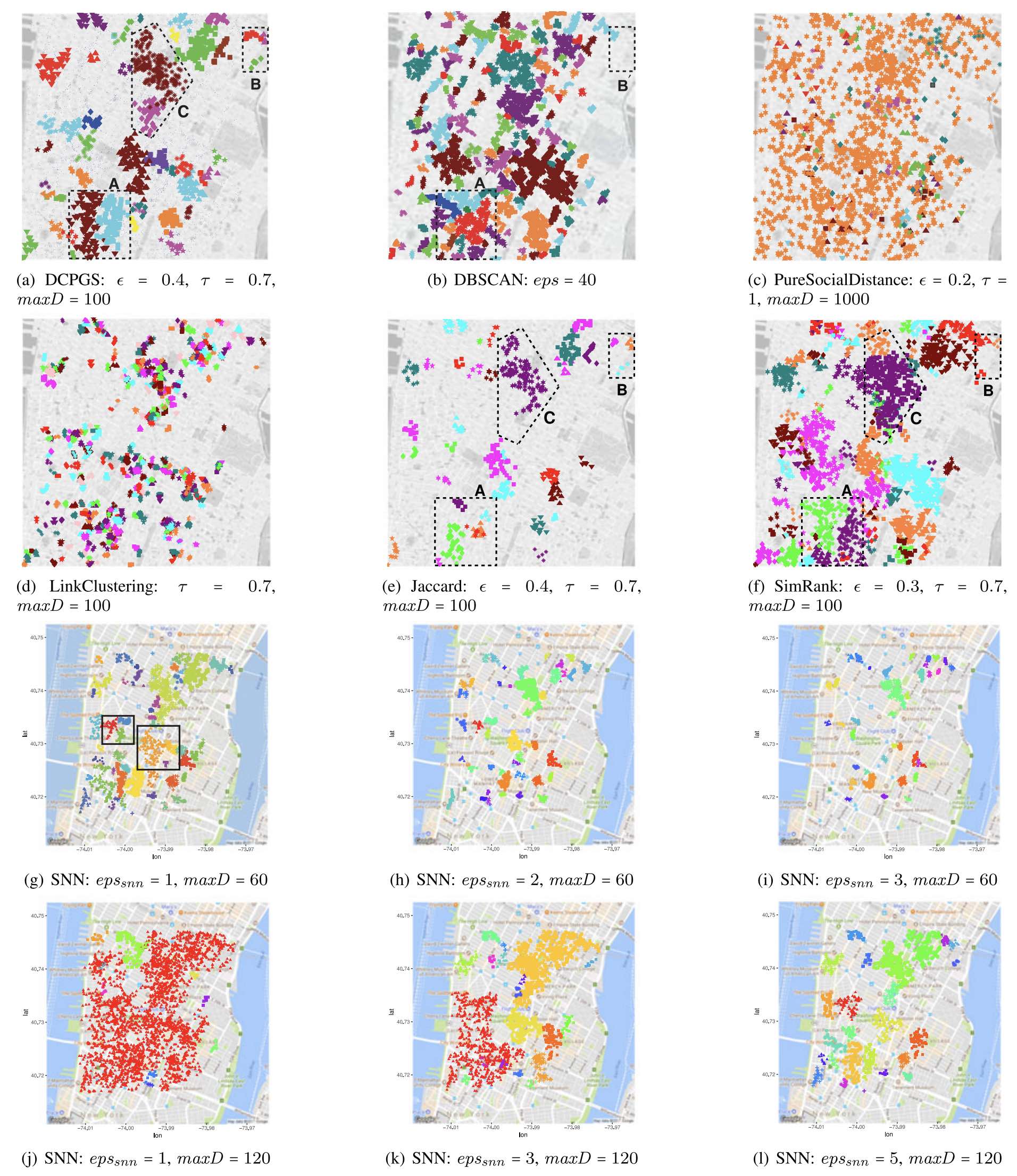
Introduction
I obtained my Ph.D. degree in Computer Science from Aalborg University, Denmark in 2011. I received my Master degree in Computer Science from Peking University, China in 2008 and my Bachelor degree in Computer Science from Huazhong University of Science & Techology, China in 2005.
I am looking for strong applicants for Postdocs, Ph.D. and Master students. Applicants may have good background in (but not limited to) mathematics, algorithms and programming. Priorities are given to those who have backgrounds on data management or data mining. The general information of big data research at Shenzhen University can be found here.
Research
My general research area is data management. Recently, much of my research concerns problems from geo-textual, geo-social network, and knowledge graph data, including data modeling, query languages, query processing, data mining, and indexing.
Efficient Retrieval of the Top-k Most Relevant Event-Partner Pairs
The proliferation of event-based social networking (EBSN) motivates studies on topics such as event, venue, and friend recommendation as well as event creation and organization. In this setting, the notion of event-partner recommendation has attracted attention. When recommending an event to a user, this functionality allows the recommendation of partners with whom to attend the event. However, in existing proposals, recommendations are pushed to users at the system’s initiative. In contrast, EBSNs provide users with keyword-based search functionality. This way, users may retrieve information in pull mode. We propose a new way of accessing information in EBSNs that combines pull and push, thus allowing users to not only conduct ad-hoc searches for events, but also to receive partner recommendations for retrieved events. Specifically, we define and study top-k event-partner (kEP) pair retrieval querying that integrates keyword-based search for events with event-partner recommendation. This type of query retrieves event-partner pairs, taking into account the relevance of events to user-supplied keywords and so-called together preferences that indicate the extent of a user’s preference to attend an event with a given partner. To compute kEP queries efficiently, we propose a rank-join based framework with three optimizations. Results of empirical studies with implementations of the proposed techniques demonstrate that the proposed techniques are capable of excellent performance.
Density-Based Top-K Spatial Textual Clusters Retrieval
So-called spatial web queries retrieve web content representing points of interest, such that the points of interest have descriptions that are relevant to query keywords and are located close to a query location. Two broad categories of such queries exist. The first encompasses queries that retrieve single spatial web objects that each satisfy the query arguments. Most proposals belong to this category. The second category, to which this paper's proposal belongs, encompasses queries that support exploratory user behavior and retrieve sets of objects that represent regions of space that may be of interest to the user. Specifically, the paper proposes a new type of query, the top-k spatial textual cluster retrieval (k-STC) query that returns the top-k clusters that (i) are located close to a query location, (ii) contain objects that are relevant with regard to given query keywords, and (iii) have an object density that exceeds a given threshold. To compute this query, we propose a DBSCAN-based approach and an OPTICS-based approach that rely on on-line density-based clustering and that exploit early stop conditions. Empirical studies on real data sets offer evidence that the paper's proposals can find good quality clusters and are capable of excellent performance.

Top-k Relevant Semantic Place Retrieval on Spatio-temporal RDF Data
RDF data are traditionally accessed using structured query languages, such as SPARQL. However, this requires users to understand the language as well as the RDF schema. Keyword search on RDF data aims at relieving users from these requirements; users only input a set of keywords, and the goal is to find small RDF subgraphs that contain all keywords. At the same time, popular RDF knowledge bases also include spatial and temporal semantics, which opens the road to spatiotemporal-based search operations. This work proposes and studies novel keyword-based search queries with spatial semantics on RDF data, namely kSP queries. The objective of the kSP query is to find RDF subgraphs which contain the query keywords and are rooted at spatial entities close to the query location. To add temporal semantics to the kSP query, we propose the kSPT query that uses two ways to incorporate temporal information. The novelty of kSP and kSPT queries is that they are spatiotemporal-aware and that they do not rely on the use of structured query languages.

Density-Based Place Clustering Using Geo-Social Network Data
Spatial clustering deals with the unsupervised grouping of places into clusters and finds important applications in urban planning and marketing. Current spatial clustering models disregard information about the people and the time who and when are related to the clustered places. This work shows how the density-based clustering paradigm can be extended to apply on places which are visited by users of a geo-social network. Our model considers spatio-temporal information and the social relationships between users who visit the clustered places. The results show that temporal-geo-social clusters have special properties and cannot be found by applying simple spatial clustering approaches and other alternatives.

Location Aware Keyword Query Suggestion Based on Document Proximity
Keyword suggestion in web search helps users to access relevant information without having to know how to precisely express their queries. Existing keyword suggestion techniques do not consider the locations of the users and the query results; i.e., the spatial proximity of a user to the retrieved results is not taken as a factor in the recommendation. However, the relevance of search results in many applications (e.g., location-based services) is known to be correlated with their spatial proximity to the query issuer. This work designs a location-aware keyword query suggestion framework, which captures both the semantic relevance between keyword queries and the spatial distance between the resulting documents and the user location.

Textually Relevant Spatial Skylines
This work studies the modeling and evaluation of a spatio-textual skyline (STS) query, in which the skyline points are selected not only based on their distances to a set of query locations, but also based on their relevance to a set of query keywords. STS is especially relevant to modern applications, where points of interest are typically augmented with textual descriptions. We investigate three models for integrating textual relevance into the spatial skyline. Among them, model STD, which combines spatial distance with textual relevance in a derived dimensional space, is found to be the most effective one. STD computes a skyline which not only satisfies the intent of STS, but also has a small and easy-to-interpret size.

Selected Publications
Dingming Wu, Erjia Xiao, Yi Zhu, Christian S. Jensen, Kezhong Lu:
Efficient Retrieval of the Top-k Most Relevant Event-Partner Pairs. IEEE Trans. Knowl. Data Eng. 35(3): 2529-2543 (2023)
Xinying Lai, Dingming Wu, Christian S. Jensen, Kezhong Lu:
A Re-evaluation of Deep Learning Methods for Attributed Graph Clustering. CIKM 2023: 1168-1177
Dingming Wu, Ilkcan Keles, Song Wu, Hao Zhou, Simonas Saltenis, Christian S. Jensen, Kezhong Lu:
Density-Based Top-K Spatial Textual Clusters Retrieval. IEEE Trans. Knowl. Data Eng. 34(11): 5263-5277 (2022)
Dingming Wu, Hao Zhou, Jieming Shi, Nikos Mamoulis:
Top-k relevant semantic place retrieval on spatiotemporal RDF data. VLDB J. 29(4): 893-917 (2020)
Dingming Wu, Dexin Luo, Christian S. Jensen, Joshua Zhexue Huang:
Efficiently Mining Maximal Diverse Frequent Itemsets. DASFAA (2) 2019: 191-207
Dingming Wu, Yi Zhu, Christian S. Jensen:
In Good Company: Efficient Retrieval of the Top-k Most Relevant Event-Partner Pairs. DASFAA (2) 2019: 519-535
Dingming Wu, Jieming Shi, Nikos Mamoulis:
Density-Based Place Clustering Using Geo-Social Network Data. IEEE Trans. Knowl. Data Eng. 30(5): 838-851 (2018)
Shuyao Qi, Dingming Wu, Nikos Mamoulis:
Location Aware Keyword Query Suggestion Based on Document Proximity. IEEE Trans. Knowl. Data Eng. 28(1): 82-97 (2016)
Jieming Shi, Dingming Wu, Nikos Mamoulis:
Textually Relevant Spatial Skylines. IEEE Trans. Knowl. Data Eng. 28(1): 224-237 (2016)
Dingming Wu, Christian S. Jensen:
A Density-Based Approach to the Retrieval of Top-K Spatial Textual Clusters. CIKM 2016: 2095-2100
Shuyao Qi, Dingming Wu, Nikos Mamoulis:
Location aware keyword query suggestion based on document proximity. ICDE 2016: 1566-1567
Jieming Shi, Dingming Wu, Nikos Mamoulis:
Top-k Relevant Semantic Place Retrieval on Spatial RDF Data. SIGMOD Conference 2016: 1977-1990
Dingming Wu, Byron Choi, Jianliang Xu, Christian S. Jensen:
Authentication of Moving Top-k Spatial Keyword Queries. IEEE Trans. Knowl. Data Eng. 27(4): 922-935 (2015)
Hui Li, Dingming Wu, Wenbin Tang, Nikos Mamoulis:
Overlapping Community Regularization for Rating Prediction in Social Recommender Systems. RecSys 2015: 27-34
Jiafeng Hu, Reynold Cheng, Dingming Wu, Beihong Jin:
Efficient Top-k Subscription Matching for Location-Aware Publish/Subscribe. SSTD 2015: 333-351
Yafei Li, Dingming Wu, Jianliang Xu, Byron Choi, Weifeng Su:
Spatial-aware interest group queries in location-based social networks. Data Knowl. Eng. 92: 20-38 (2014)
Dingming Wu, Yafei Li, Byron Choi, Jianliang Xu:
Social-Aware Top-k Spatial Keyword Search. MDM (1) 2014: 235-244
Hui Li, Dingming Wu, Nikos Mamoulis:
A revisit to social network-based recommender systems. SIGIR 2014: 1239-1242
Jieming Shi, Nikos Mamoulis, Dingming Wu, David W. Cheung:
Density-based place clustering in geo-social networks. SIGMOD Conference 2014: 99-110
Lisi Chen, Gao Cong, Christian S. Jensen, Dingming Wu:
Spatial Keyword Query Processing: An Experimental Evaluation. Proc. VLDB Endow. 6(3): 217-228 (2013)
Dingming Wu, Man Lung Yiu, Christian S. Jensen:
Moving spatial keyword queries: Formulation, methods, and analysis. ACM Trans. Database Syst. 38(1): 7:1-7:47 (2013)
Xin Cao, Gao Cong, Christian S. Jensen, Jun Jie Ng, Beng Chin Ooi, Nhan-Tue Phan, Dingming Wu:
SWORS: A System for the Efficient Retrieval of Relevant Spatial Web Objects. Proc. VLDB Endow. 5(12): 1914-1917 (2012)
Dingming Wu, Man Lung Yiu, Gao Cong, Christian S. Jensen:
Joint Top-K Spatial Keyword Query Processing. IEEE Trans. Knowl. Data Eng. 24(10): 1889-1903 (2012)
Dingming Wu, Gao Cong, Christian S. Jensen:
A framework for efficient spatial web object retrieval. VLDB J. 21(6): 797-822 (2012)
Yafei Li, Dingming Wu, Jianliang Xu, Byron Choi, Weifeng Su:
Spatial-aware interest group queries in location-based social networks. CIKM 2012: 2643-2646
Dingming Wu, Man Lung Yiu, Christian S. Jensen, Gao Cong:
Efficient continuously moving top-k spatial keyword query processing. ICDE 2011: 541-552
Gao Cong, Christian S. Jensen, Dingming Wu:
Efficient Retrieval of the Top-k Most Relevant Spatial Web Objects. Proc. VLDB Endow. 2(1): 337-348 (2009)
